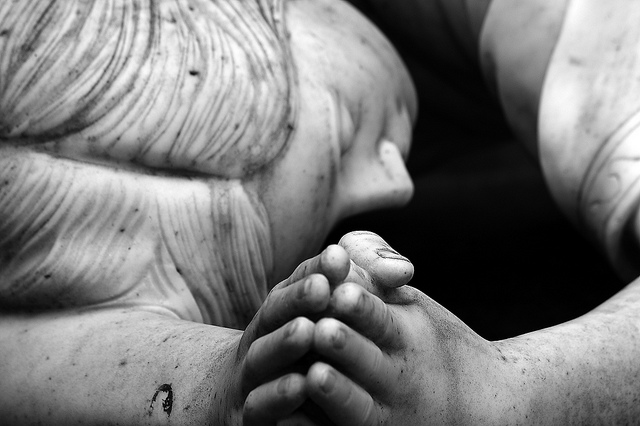We run our website the way we wished the whole internet worked: we provide high quality original content with no ads. We are funded solely by your direct support. Please consider supporting this project.

Why Prayer Matters
Two questions about prayer:
- What possible difference can prayer make to an all-good and all-powerful God?
- Why would an all-wise God leverage so much of his will being done on earth on whether or not his people talk to him?
These questions began to be resolved for me when I began to think about prayer in light of God’s purpose for creation. God created humans to be his viceroys on the earth. We were placed here to administrate God’s loving providence “on earth as it is in heaven.” Out of the fullness of life we get from our relationship with God, we were to reflect God’s loving character and purpose to each other, the animals and the earth. He gave us “say-so” over this domain, with the goal that we would, in love, choose to align our “say-so” with his “say-so” so that his loving “say-so” would reign on the earth through us. We were thus to be co-laborers with God and co-rulers with Christ (2 Tim. 2:12; Rev. 5:10, 20:6), ensuring that the earth would be the domain of God’s reign—the Kingdom of God.
We all know we have “say-so” on a physical level. Our ideas, words and bodily activity impact others and affects what comes to pass, for better or for worse. The Bible’s teaching on prayer reveals that this isn’t our only, or even our primary, “say-so.” We also have a “say-so” to impact God and to affect what comes to pass on a spiritual level, and this “say-so” is activated when we communicate with God.
In this light, it’s really no more difficult to understand why God would to some extent leverage his will being done “on earth as it is in heaven” on prayer than it is to understand why God would to some extent leverage anything on our choice to use our physical ‘say-so” in various ways. If God wants a world that is capable of sharing in and reflecting his love, he must populate it with free agents who have their own “say-so”—and to this extent the accomplishing of his “say-so” on earth must depend on how we freely choose to use our “say-so.”
Nor do I any longer find it hard to understand why God leverages so much on whether or not his people use their spiritual “say-so” in ways that align themselves with his will. Think about it. Everything about God’s purpose for creation is centered on our choosing to enter into a loving relationship with him. Relationships are all about communication. We relate to others only as we communicate ourselves in a variety of ways to them and they communicate themselves to us. Relationships and communication are two sides of the same coin.
If the central goal of creation is a relationship with God that empowers humans to be God’s viceroys on the earth, it makes sense that God would design the world such that communicating with him would be a central means by which we carry out our viceroy duties. While it violates the common sense of our carnal minds to trust in prayer, if you think about the matter in terms of God’s purpose for creation, it makes sense that the most important exercise of our “say-so” would be bound up with our communication with God.
God thus restricts much of what he can do on whether or not his people communicate with him. He structures reality in such a way that a great deal of what comes to pass revolves around, and hinges upon, our communicating with him.
The following analogy may not work for everybody, but it helps me sometimes to think of power in terms of “units of say-so.” God is all-powerful, which means he owns all the “say-so” there is. But when he decided to populate the creation with free agents, he gave each human various units of “say-so.” (He also gave angels “say-so,” but let’s keep it simple and just focus on humans for the moment.) We each have a certain amount of power to affect what comes to pass by our choices.
Now, because God’s central goal in creation was to invite people to enter into and cultivate a relationship with him, and because relationships are all about communication, God also set aside a vast reservoir of “say-so” that is accessed only by communicating with him. Because of how central this objective is for God, he covenanted with himself to release this “say-so” only if his people pray. There is thus a vast array of possible things that God would like to do but which he will not do—indeed, given his covenant with himself, that he cannot do—unless his people align their hearts with his in prayer. Of course he has the sheer power to do whatever he wants. But given the kind of world he created, there are things he cannot do unless his people align their hearts with him in prayer.
This is an analogy that helps me understand all the “if – then” statements attached to prayer in the Bible. It explains the incredible urgency Jesus and the rest of the Bible attaches to prayer. As John Wesley, Watchmen Nee, and many others have argued, to a significant degree, God genuinely needs his people to pray to accomplish his will on earth as it is in heaven.
Image by _Pek_ via Flickr
Category: General
Tags: Free Will, Prayer
Topics: Hearing God, Prayer
Related Reading

Revelation 13:8 refers to “everyone whose names have not been written before the foundation of the world in the book of life.” How does that square with open theism?
Three possibilities exist in terms of reconciling Revelation 13:8 with open theism. 1) First, the “from the foundation of the world” clause can attach to either “everyone whose names have not been written” or to “the lamb that was slain.” For example, the TNIV translates this passage “All inhabitants of the earth will worship the…

A Brief Theology of Hearing God
It is sometimes assumed by modern readers that when believers in the Bible heard a message or saw a vision while praying, it was something people perceived with their physical eyes and heard with their physical ears. If anyone else had been present with these believers when they heard God speak or received their vision,…

Hearing and Responding to God: Part 7 (Final)
Here’s Greg’s final installment of this series (for real). Today he discusses our default settings when taking action. Do you generally do what is reasonable and seems right unless God says no, or do you wait and not act until you sense that God says yes? Hear what Greg has to say about that. You…

Tragedy Strikes and Coherence Goes Out the Window
I encourage you to read Aurora shooting inspires various perspectives on God and belief, written by Electa Draper and published on the front page of the Denver Post Monday. The article shows how differently believers process tragedies, and illustrates the centrally important role one’s picture of God plays in these responses. For today, I’d like…

Why Compatibilistic Freedom Does Not Make Sense
Compatibilism is the view that free will is compatible with determinism. In this view, freedom is defined as the ability to do what you want, though what you want is determined by factors outside of you. Theologians who espouse this perspective, hold that God ultimately determines what individuals want. This is in contrast to “self-determining…

When God’s “Plan A” Falls Through, What’s Next?
Image by Katie Tegtmeyer via Flickr Suzanne was angry, to say the least. Since her early teens, her only aspirations in life were to be a missionary to Taiwan and to marry a godly man with a similar vision, and she prayed daily about these. She went to a Christian college and, quite miraculously, quickly met…
